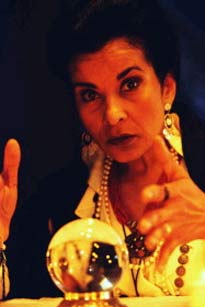Who wants to be a healer?
 People's interest in parapsychology and healing has significantly risen in the past few years.
People's interest in parapsychology and healing has significantly risen in the past few years.

However, science still refuses to examine the phenomenon seriously. Perhaps the only serious scientist in the post Soviet Russia is chair of social and practical psychology of Labour Academy and social relations of Ukraine Elena Karagodina who still shows tremendous interest in healers.
She graduated with a degree in psychiatry and has been studying the healer’s phenomenon since 1995. Elena's doctorate work was called “Socio-Cultural Analysis of Healers and Paranorms.” Commentator from “Izvenstia” Tatyana Bateneva interviews professor Elena Karagodina.
-What was the main goal of your research?
-In the beginning, my interest in healing and paranormal phenomenon has been strictly professional. The whole idea of trying to examine mental conditions of healers has occurred to me back in the early 90s while I was taking some additional classes at the Dnepropetrovsk Medical University. The main question concerned the fact whether healer's condition can be regarded as psychological disorder. However, soon we decided to examine this phenomenon in a socio-cultural context on a larger scale. This is how we came up with the idea of socio-psychological classification of the phenomenon associated with healing practices.
-How many people were able to examine and using what particular methods?
-I examined 100 respondents-healers, who first had to undergo special commission at the Ukrainian association of national medicine. I also examined 150 patients. We used methods of psychiatric and psychological research along with various sociological principles, including structural interview, monitoring of their activity within various health organizations and religious groups.
-Can you paint a picture of a healer? What kind of person is he/she?
-This is a middle-aged person, with basic education, having experienced loss of his relative, someone close. This person managed to find a way out of his depression and always aimed at sharing his personal experiences with the rest of the population. He is energetic and a believer.
-What about a healer's mental state?
-If we are to judge based on today's materialistic approach of modern medicine, approximately three quarters of all healers suffer from various psychological disorders. Personally, I am inclined to believe that no more than 20% of those who call themselves healers suffer from some disorders.
-Can you tell us what sort of people find themselves in need of their services?
-We were not trying to study this particular factor. However, it always interested me why people prefer to go to healers and parapsychologists when they have a chance to visit doctors.
As it turned out, people who tend to attend healers are those with chronic illnesses and who are unsatisfied with the results of normal medical treatments.
-How do people determine whether they want to be “treated” by one particular healer?
-We were able to determine that the main criteria is similarity between a patient’s and a healer’s view points. Namely, if a person himself believes in the fact that the reason for his illness is in fact a result of an evil eye, then he will most likely be interested in undergoing treatments with that particular healer.
-Does it mean that healing in itself resembles psychotherapeutic procedures, rather than treatment in its physical sense?
-In general, that relationship between a classical doctor and his patient is also often based on their mutual trust and their perceptions of illnesses and treatments. Their contact is mainly aimed at reducing tension between the two parties.
-In your opinion, what are the possible perspectives of such healing practices?
-Taking into account foreign experiences, where medical care is more accessible and of better quality, one can assume that the overall interest in such alternative medicine will soon decrease. However, it will never disappear fully. For instance, during the mid 90s about 57% of Australians expressed their interest in alternative medicine, 46% of Germans and 49% of French. In 1997, 627 million visits to those healers of alternative medicine have been registered among Americans in 1997.
-How would you characterize the results of your research?
-Personally, I was able to perceive those multifaceted problems and aspects of psychiatry. I no longer judge their activity as “absurd”.
-Judging by your story, healing represents an alternative to the scientific medicine. Can you explain those psychological and social roots of public interest towards it?
-It possesses roots of local origin (socio-economic crisis, losing one's own life's goals) as well as some broader issues. I consider modern “paranormal” healing techniques as just another trend of the New Age. It can be viewed as a complex socio-cultural and religious phenomenon, which has taken its roots in Western European countries and Northern America during 70s. Some scientists assume that people tend to turn to alternative medicine as a result of major developments in traditional medicine, the so-called medical revolution, when regular healers cling to the old traditions.
Source: based on materials of Elena Karagodina (Tavrichesky psychiatry journal, 2002. №3).
Subscribe to Pravda.Ru Telegram channel, Facebook, RSS!


